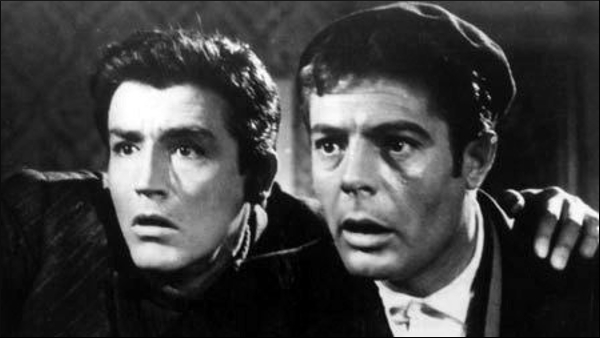Sometimes, the success of a film goes beyond its producers’ expectations and ambitions, as it unintentionally becomes a blockbuster, well-known across the world. This is certainly the case if I soliti ignoti, by Mario Monicelli. This 1958 movie was originally meant as a parody of French and American heist films. The title refers to how journalists used to called the perpetrators of unresolved thefts, “the usual unknowns.”I soliti ignoti tells the story of a group of loafers and smalltime crooks who join together to organize a heist that will presumably change their lives, hoping to break into a pawnshop through an empty flat.
"The movie does not simply represent a heist, but also depicts a milieu untouched by the economic boom that spread through Italy during the 1950s"
The team is made up of Beppe il Pantera (Beppe the Panther), a boxer who always loses; Ferribotte, a jealous Sicilian; Tiberio, a photographer without a camera; Capannelle, a perpetually hungry old man; and Mario, a mama’s boy. They are far from being experts in the field, but they come up with an elaborate plan with the help of Dante Cruciani, a retired thief and a specialist in safe-cracking. I soliti ignoti is built like a proper thriller, not only in terms of story but also of narrative structure (one of the protagonists even dies, which is unusual for a comedy). However, the result is absolutely comical, as everything goes from bad to worse. At the same, the movie does not simply represent a heist, but also depicts a milieu untouched by the economic boom that spread through Italy during the 1950s. Even in such a florid age, richness and well-being were not for all.

The success of neo-realism in the 1940s (a post-war Italian film movement that employed non-actors in real-life settings to portray large-scale social problems) legitimized the use of dialects in Italian cinema. Monicelli’s characters come from different places and, therefore, speak different dialects. Ferribotte talks in Sicilian: “A tia! Bedda madre!” instead of “A te! Mamma mia!” (To you! Holy mother!). Nicoletta, in Venetian: “Ci ha fato male, poareti” instead of “Gli ha fatto male,poveretti” (You hurt them, poor men). And Cosimo, in Roman: “A moretto, guarda che, si nun ricacci tutti i sordi miei, hai finito di campare” instead of “Amico, guarda che, se non mi restituisci i soldi, hai finito di vivere” (Mate, mind this, if you do not give me all my money back, you will not live long).
Also, the characters use the language of the criminal underworld. So, for instance, “il colpo” (the heist) becomes “lo sgobbo”, “la cassaforte” (the safe) becomes “la commare”, “la polizia” (the police) becomes “la madama”, and “falso colpevole” (fake culprit) becomes “la pecora”. But these men are not real thieves. They fail at robbing the pawnshop and end up stealing some “pasta e ceci” instead. What is worse, when morning arrives, some of them end up having to work for real, for the first time in their lives.
The success of the film was so far-reaching that it even received two sequels: Audace colpo dei soliti ignoti, in 1959, and the forgettable I soliti ignoti venti anni dopo, in 1985. It was also remade at least twice in Hollywood, as Crackers, in 1984, and as Welcome to Collinwood, in 2002. Unfortunately, though, they were far from successful, as they could not recreate a world that no longer existed, and skilled actors like Sean Penn and George Clooney could not bring back to life Campannelle or Dante Cruciani, whose faces reminded audiences of a time when hunger and poverty were the rule.




